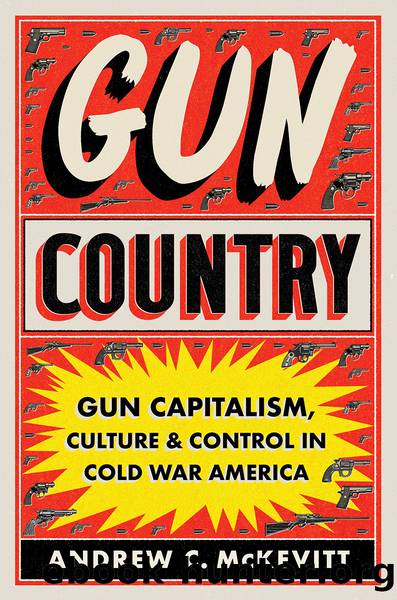Gun Country by Andrew C. McKevitt

Author:Andrew C. McKevitt
Language: eng
Format: epub
Publisher: The University of North Carolina Press
Published: 2023-08-17T00:00:00+00:00
Carterâs anxiety over the feminization of society was an implicit rejection of both the CHCâs claims to authority as mothers and consumers and the idea that guns could be treated as just another aspect of consumer society, that Americans ought to think about them as dangerous consumer products to be regulated like tricycles or oven cleaners. Self-defense was a sacred, masculine right, not a cheap product to be negotiated and regulated on the consumer market. When Carter told Conyersâs committee that allowing dangerous people access to guns was âa price we pay for freedom,â the CHC countered by turning back to guns as part of a consumer marketplace: âWe canât help but ask what kind of freedom we are buying and at what price.â47 The rejoinder demonstrated the CHCâs and Carterâs clashing visions of gun culture, the CHC framing it as a material one, a part of modern industrial consumer society that should be regulated as any other part; Carter, in contrast, saw it as sacrosanct, a masculine domain to be defended from the feminization of society that threatened to undermine basic values like the nuclear family and male authority.
In May 1975 Carter sat on a stage in Los Angeles to speak on a panel at the invitation of the proâgun control US Conference of Mayors. He knew he had an unfriendly audience, and he pulled no punches explaining why the gun control advocates sitting before him were fighting a losing cause. He wasnât there to tell them that Americans were buying so many guns because they were innocent hunters. Instead, gun stores were doing such good business because Americans were preparing for the breakdown of the social order, because they believed the political and legal systems had abandoned them. âI suspect it is fear,â he said. âI suspect it is a lack of confidence in society.â Politicians who harped on guns would âcontinue in this country to do nothing effective about evil men, to do nothing effective about criminals,â and in the process would âeventually cause every household in America to be armedâlawfully or notâand like it or not.â âWe are denied freedom from fear,â he told the audience. âAnd fear, most often, makes people go out and buy a gun who would never have done so otherwise.â He described urban-dwelling Americans living a âbesieged existenceâ where âmarauders possess the streets at night.â Nothing was better for gun sales, he admitted, than nightly news reports of violent crime. âGo out and ask the neighborhood gun dealers in this country and they will tell you that after heinous crimes have been committed . . . there has been an increase in gun sales.â48 He almost dared gun control advocates to pass more laws; they just didnât seem to get the point that Americans were terrified and would go out and buy guns one way or another. What Americans saw when they turned on the news or opened the newspaper was seemingly more crime and few consequences for it.
Now, explain that
Download
This site does not store any files on its server. We only index and link to content provided by other sites. Please contact the content providers to delete copyright contents if any and email us, we'll remove relevant links or contents immediately.
The Secret History by Donna Tartt(16664)
The Social Justice Warrior Handbook by Lisa De Pasquale(11494)
Thirteen Reasons Why by Jay Asher(7803)
This Is How You Lose Her by Junot Diaz(5800)
Weapons of Math Destruction by Cathy O'Neil(5048)
Zero to One by Peter Thiel(4836)
The Myth of the Strong Leader by Archie Brown(4796)
Promise Me, Dad by Joe Biden(4459)
Beartown by Fredrik Backman(4435)
Stone's Rules by Roger Stone(4423)
How Democracies Die by Steven Levitsky & Daniel Ziblatt(4415)
The Fire Next Time by James Baldwin(4352)
100 Deadly Skills by Clint Emerson(4086)
A Higher Loyalty: Truth, Lies, and Leadership by James Comey(4041)
Rise and Kill First by Ronen Bergman(4022)
The David Icke Guide to the Global Conspiracy (and how to end it) by David Icke(3892)
The Farm by Tom Rob Smith(3878)
Secrecy World by Jake Bernstein(3790)
The Doomsday Machine by Daniel Ellsberg(3738)
